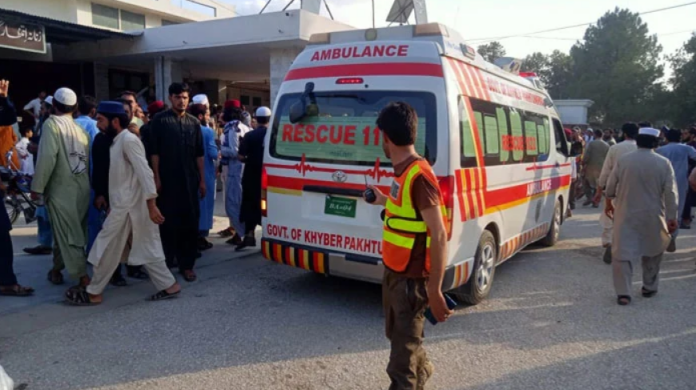—– FIR registered against unidentified culprits
—– CTD collects evidence from crime site, completes geo-fencing
—– Peshawar Corps Commander visits Khar
Peshawar: The death toll from Sunday’s suicide bombing at a Jamiat Ulema-i-Islam-Fazl (JUI-F) gathering in Khyber Pakhtunkhwa’s Bajaur district rose to 46 on Monday as the Counter Terrorism Department registered a first information report of the attack.
More than 40 people were killed and over 150 others injured in Khar, a town bordering Afghanistan, when a powerful explosion ripped through the JUI-F convention.
According to eyewitnesses, hundreds of party workers along with local leaders were present at the gathering when the blast occurred. The bomb went off when a party leader was addressing the convention. JUI-F officials told that the party’s Khar General Secretary Ziaullah, JUI-F District Press Secretary Mujahid Khan and his son were among the dead. The death toll is feared to increase further. According to the district administration and Rescue 1122 officials, the explosion occurred at 4pm near the Shandi area, some 2km from Khar.
Dr Naseeb Gul, the district medical superintendent of the Khar hospital, told on Monday that the death toll of the explosion increased to 46 after another injured person succumbed to his wounds.
He said approximately 90 wounded people were brought to the medical facility, adding that 36 bodies had been handed over to the heirs after identification.
Dr Gul said the deceased included five children.
Meanwhile, traders in Bajaur have announced a shutter-down strike across the district.
FIR registered
The KP CTD has lodged an FIR against unknown suspects on charges of terrorism, murder, attempted murder and others.
The FIR, was registered on the complaint of Station House Officer — Kharniaz Muhammad.
It stated that a “suicide attack” ripped through the JUI-F gathering at around 4:10pm on Sunday, claiming the lives of Maulana Ziaullah Jan — the party’s Khar general secretary — and others.
Separately, Senior Superintendent (SP) Amjad Khan said investigators had already visited the crime site and gathered evidence to advance with the ongoing probe.
He said more than 10 kilogrammes of explosives were used in the attack, adding that the process of geo-fencing at the blast site had also been completed.
Peshawar corps commander visits Bajaur
Earlier today, Peshawar Corps Commander Lt Gen Hassan Azhar Hayat visited the District Headquarters Hospital Khar to inquire about the injured persons.
During his visit, Gen Hayat directed the hospital administration to ensure that all victims receive the best possible medical treatment.
Additionally, he also met with the family members of those injured and killed in the explosion and extended his condolences over the incident.
IS-K involvement feared
According to a report, security officials believed that yesterday’s bombing was a “suicide attack”. A senior police official claimed that the militant Islamic State (Islamic State in Khorasan, or IS-K) group was possibly involved in the attack.
“There is no question about it,” the official said.
“There was no threat of bombing in the district,” security officials told.
It may be noted that reports had earlier indicated the presence of IS-K in the Bajaur district. In June, the Counter Terrorism Department (CTD) had neutralised three IS-K men in the tribal district, they said.
The blast drew across-the-board condemnations as well. Prime Minister Shehbaz Sharif, former premier Imran Khan, KP Governor Ghulam Ali, caretaker Chief Minister Muhammad Azam Khan and other politicians also condemned the explosion. The CM had also ordered the police to submit a report pertaining to the blast.
Surge in terrorism
Bajaur is one of seven remote districts bordering Afghanistan in a region that was once a focal point in the global war on terror.
Over the past few months, the law and order situation in Pakistan has worsened, with terrorist groups executing attacks with near impunity across the country.
Since the talks with the TTP broke down in November, the militant group has intensified its attacks, particularly targeting the police in KP and areas bordering Afghanistan. Insurgents in Balochistan have also stepped up their violent activities and formalised a nexus with the outlawed TTP.
A report released this month by think tank Pakistan Institute for Conflict and Security Studies said the first half of the current year witnessed a steady and alarming rise in terror and suicide attacks, claiming the lives of 389 people across the country.
Last week, a policeman was martyred in a “suicide blast” inside a mosque in the Jamrud area of KP’s Khyber district.
In January, a suicide bomber linked to TTP blew himself up in a mosque inside a police compound in the northwestern city of Peshawar, killing more than 80 officers.
The militant assaults have been focused on regions abutting Afghanistan, and Islamabad alleges some are being planned on Afghan soil — a charge Kabul denies.
Earlier this month, the armed forces of Pakistan expressed “serious concerns on the safe havens and liberty of action available to” the banned TTP in Afghanistan.
“The involvement of Afghan nationals in acts of terrorism in Pakistan is another important concern that needs to be addressed. Such attacks are intolerable and would elicit an effective response from the security forces of Pakistan,” it said. –Agencies




